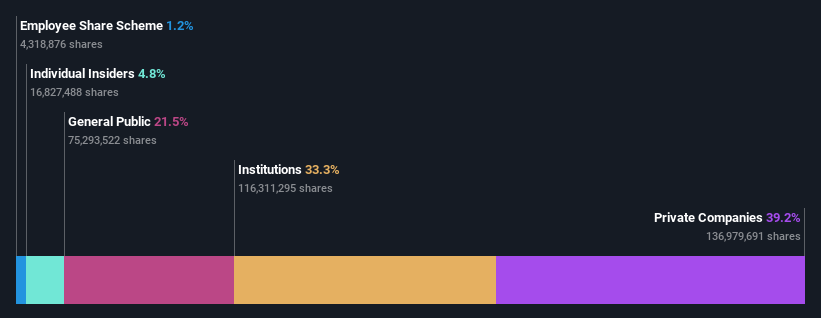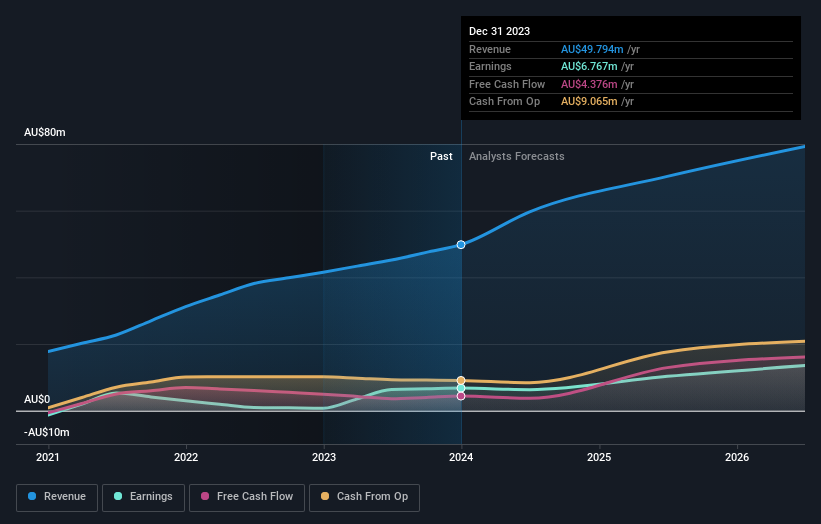While institutions invested in Smart Parking Limited (ASX:SPZ) benefited from last week's 16% gain, private companies stood to gain the most
Key Insights
Significant control over Smart Parking by private companies implies that the general public has more power to influence management and governance-related decisions
55% of the business is held by the top 3 shareholders
If you want to know who really controls Smart Parking Limited (ASX:SPZ), then you'll have to look at the makeup of its share registry. The group holding the most number of shares in the company, around 39% to be precise, is private companies. That is, the group stands to benefit the most if the stock rises (or lose the most if there is a downturn).
While private companies were the group that benefitted the most from last week’s AU$23m market cap gain, institutions too had a 33% share in those profits.
Let's take a closer look to see what the different types of shareholders can tell us about Smart Parking.
View our latest analysis for Smart Parking
What Does The Institutional Ownership Tell Us About Smart Parking?
Many institutions measure their performance against an index that approximates the local market. So they usually pay more attention to companies that are included in major indices.
Smart Parking already has institutions on the share registry. Indeed, they own a respectable stake in the company. This can indicate that the company has a certain degree of credibility in the investment community. However, it is best to be wary of relying on the supposed validation that comes with institutional investors. They too, get it wrong sometimes. If multiple institutions change their view on a stock at the same time, you could see the share price drop fast. It's therefore worth looking at Smart Parking's earnings history below. Of course, the future is what really matters.
Smart Parking is not owned by hedge funds. Looking at our data, we can see that the largest shareholder is Finico Pty. Ltd. with 34% of shares outstanding. With 16% and 5.5% of the shares outstanding respectively, Microequities Asset Management Pty Limited and Mutual Trust Pty Ltd, Asset Management Arm are the second and third largest shareholders. In addition, we found that Paul Gillespie, the CEO has 1.7% of the shares allocated to their name.
After doing some more digging, we found that the top 3 shareholders collectively control more than half of the company's shares, implying that they have considerable power to influence the company's decisions.
While studying institutional ownership for a company can add value to your research, it is also a good practice to research analyst recommendations to get a deeper understand of a stock's expected performance. There is some analyst coverage of the stock, but it could still become more well known, with time.
Insider Ownership Of Smart Parking
The definition of an insider can differ slightly between different countries, but members of the board of directors always count. Management ultimately answers to the board. However, it is not uncommon for managers to be executive board members, especially if they are a founder or the CEO.
Most consider insider ownership a positive because it can indicate the board is well aligned with other shareholders. However, on some occasions too much power is concentrated within this group.
We can report that insiders do own shares in Smart Parking Limited. It has a market capitalization of just AU$164m, and insiders have AU$7.9m worth of shares, in their own names. Some would say this shows alignment of interests between shareholders and the board, though we generally prefer to see bigger insider holdings. But it might be worth checking if those insiders have been selling.
General Public Ownership
The general public-- including retail investors -- own 22% stake in the company, and hence can't easily be ignored. While this size of ownership may not be enough to sway a policy decision in their favour, they can still make a collective impact on company policies.
Private Company Ownership
It seems that Private Companies own 39%, of the Smart Parking stock. It might be worth looking deeper into this. If related parties, such as insiders, have an interest in one of these private companies, that should be disclosed in the annual report. Private companies may also have a strategic interest in the company.
Next Steps:
I find it very interesting to look at who exactly owns a company. But to truly gain insight, we need to consider other information, too.
I always like to check for a history of revenue growth. You can too, by accessing this free chart of historic revenue and earnings in this detailed graph.
If you would prefer discover what analysts are predicting in terms of future growth, do not miss this free report on analyst forecasts.
NB: Figures in this article are calculated using data from the last twelve months, which refer to the 12-month period ending on the last date of the month the financial statement is dated. This may not be consistent with full year annual report figures.
Have feedback on this article? Concerned about the content? Get in touch with us directly. Alternatively, email editorial-team (at) simplywallst.com.
This article by Simply Wall St is general in nature. We provide commentary based on historical data and analyst forecasts only using an unbiased methodology and our articles are not intended to be financial advice. It does not constitute a recommendation to buy or sell any stock, and does not take account of your objectives, or your financial situation. We aim to bring you long-term focused analysis driven by fundamental data. Note that our analysis may not factor in the latest price-sensitive company announcements or qualitative material. Simply Wall St has no position in any stocks mentioned.

 Yahoo Finance
Yahoo Finance 

